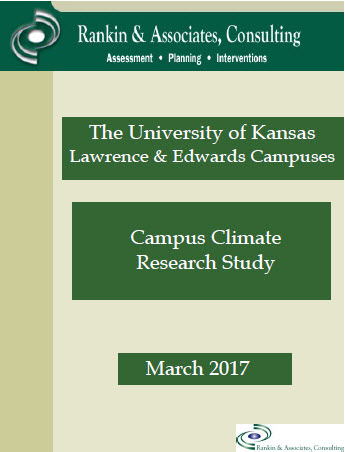By Doug Ward
At a meeting to provide highlights of KU’s latest climate survey, Emil Cunningham of Rankin & Associates asked audience members a question:
What is the point of higher education?
“Students,” someone in the audience said.
“That’s right,” he said. “Our purpose for being here is students.”
Cunningham is right, but the answer is more complicated than that. A university is an intellectual community with many different interests and goals that compete for the time of faculty members, staff members and students. Those include research, and service to the community, the state and alumni. At its heart, though, a university exists to educate students and to help them become mindful citizens.

Or does it?
Although he stressed the importance of students, Cunningham failed to bring up a statistic that speaks to the value of students: Only 64 percent of tenured and tenure-track faculty members who took the survey said the university valued teaching, compared with 83 percent who said the university valued research. Among non-tenure-track faculty, those numbers were 63 percent 86 percent.
Those figures reflect what those of us who value innovative, high-quality teaching already know: The rewards system is heavily weighted toward research. To say that teaching takes a back seat to research would be an understatement. Teaching is more like a trailer hooked to the back of a carefully polished SUV.
One faculty member put it this way in the survey: “I think that KU *says* teaching is valued far more than it is actually valued when it comes to compensation, job security, etc.”
Service, the third leg of the university’s three-legged platform of teaching, research and service, fared even worse than teaching in the survey. Service means many things, from sitting on governance committees to leading community events to participating in workshops to guiding junior colleagues. It also keeps the university running through administrative roles at many levels. In many cases, though, service goes hand in hand with teaching through such means as advising and mentoring students – responsibilities that are not equally shared.
Only 45 percent of tenured and tenure-track faculty said they thought KU valued service, and 47 percent said they did more work to help students than their colleagues did.
“Service and teaching obligations are not equal in our department,” one respondent said. “If we do a good job (i.e. do our job) in either regards, we are given more jobs to do. Those who don’t fulfill their service or teaching obligations are just taken off committees or given reduced teaching because they are bad at it.”
Another offered this: “So much service, so many students, not enough hours in the week.”
Women, especially, reported unfair distribution of service loads, with 50.4 percent of female faculty members saying they felt burdened by service, compared with 30.4 percent of men.
“As one of the few women in my department I feel that I am tasked with more service because I actually do the assigned work,” one respondent said.
Everything wasn’t gloomy. Seventy-seven percent of undergraduates and 83.7 percent of graduate students said they felt that faculty members valued them, and slightly smaller percentages (70 and 80) said there were faculty members they perceived as role models.
Those are encouraging numbers, but if we truly value students, we will make teaching a higher priority and reward those who serve students and colleagues. KU takes teaching more seriously than many other universities but not seriously enough that teaching actually carries weight in the reward system. As one faculty member said in the survey: “If teaching were valued at KU, KU would value its teachers.”
That leads back to the earlier question:
What is the point of higher education?
Doug Ward is the associate director of the Center for Teaching Excellence and an associate professor of journalism. You can follow him on Twitter @kuediting.